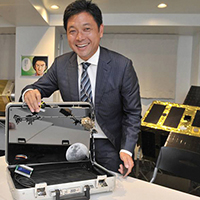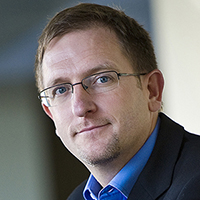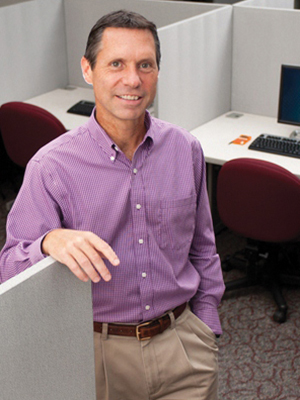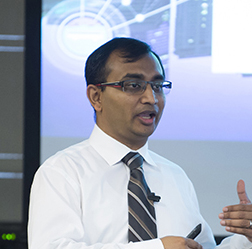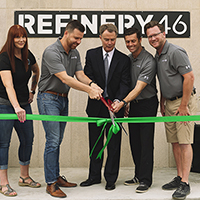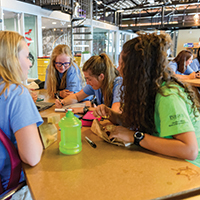 An expert in work-life balance, Ellen Ernst Kossek says many people develop health problems while trying to keep in step with the giant leaps being made in technology and the modern workplace. (Stock image)
An expert in work-life balance, Ellen Ernst Kossek says many people develop health problems while trying to keep in step with the giant leaps being made in technology and the modern workplace. (Stock image)
Finding the Right Balance
Giant Leaps in Health, Longevity and Quality of Life
Ellen Ernst Kossek want you to live longer. And that may start with how you work.
Kossek, the Basil S. Turner Professor of Management and research director of Purdue’s Susan Bulkeley Butler Center for Leadership Excellence, is an expert on work-life balance.
 Indeed, Kossek has won numerous awards for her contributions to the field. In August 2018, she earned the distinction of becoming only the second faculty member from Krannert to be inducted as a Fellow in the prestigious Academy of Management.
Indeed, Kossek has won numerous awards for her contributions to the field. In August 2018, she earned the distinction of becoming only the second faculty member from Krannert to be inducted as a Fellow in the prestigious Academy of Management.
“Ellen is a foundational scholar in the domain of work and family research and has been instrumental in advancing this important field of study,” says Carrie R. Leana, the George H. Love Professor of Organizations and Management and director of the Center for Healthcare Management at the University of Pittsburgh. Leana was one of two existing fellows who nominated Kossek.
“The questions she asks are theoretically interesting and practically important, prompting others to think about management from new perspectives and consider constituencies that have been historically underrepresented.”
Here, we share some of the latest insights from Kossek’s prolific body of research.
The 24/7 Culture
From social networks to cloud-based applications, it’s possible to be connected 24/7. In “Always On, Always Working?” in The Economist, Kossek explores how constant communication can have negative consequences on our lives.
“Adults with addictive personalities might need to be trained, just like children over-using video games,” she writes.
Some companies have moved in the direction of restricting or even banning off-hours communications. But Kossek is concerned that this could create an inequality among employees, excluding those with long commutes or care duties who need access to work outside of business hours. She says companies should “start at the top” by providing employees with the resources needed to work flexibly without encouraging a 24/7 culture.
The Work-Life Flexibility Problem
Although many studies on work-life flexibility have been conducted, Kossek recognized that most didn’t account for occupational differences across workers.
Kossek and Brenda Lautsch, a professor and associate dean at the Beedie School of Business at Simon Fraser University in British Columbia, Canada, summarize their findings on the topic in “Hourly Workers Need Flexibility the Most, but are Often the Least Likely to Get It” in Harvard Business Review.
“Our research suggests that it may not simply be the work-life flexibility practices themselves that can harm or benefit productivity; instead, it’s how employers manage equality in access, use, and implementation,” they write. “Employers play a critical role in redesigning workplaces to provide all employees with greater control over how their work is reconciled with their personal lives.”
The Cost of Presenteeism
To go to work; to not go to work — it’s a dilemma ill employees face all of the time. Kossek has studied this costly situation with a concept called presenteeism.
“It means an ill worker shows up on the job, is visibly there, but is not productive. And that person can easily be spreading sickness,” she writes.
Factors that can contribute to presenteeism include an understaffed workplace or penalties for workers who attend to personal or family needs.
Many companies are now considering sick leave as social insurance for employees as opposed to an expensive entitlement. Kossek suggests that more employers include policies — such as having backups or being able to work from home — to help ensure that employees, and the workplace as a whole, are healthy and productive.
Tips for New Graduates
College graduates might expect busy days and long nights as they start their own businesses or climb the corporate ladder, but Kossek says habits formed at the entry level could follow workers throughout their careers.
“After you graduate, you will be faced with lots of opportunities to work intently in order to advance on your career path,” says Kossek. “Early in this process, you should also begin forming healthy personal habits for your own long-term well-being.”
The work-life expert offers these five tips to recent graduates entering the workforce:
SCHEDULE FUN (AND HEALTHY) WAYS TO UNWIND: “Take time to reflect on ways you can unwind and identify your passions to continue as you enter the world of full-time work. Is it tennis, a book club, running, Comic-Con, gaming, lunch with friends, working out at the gym, walking in nature with a pet? Whatever makes you feel good and your heart sing. Try to organize your calendar to block out time daily or weekly as you plan your workweek. It is easy for work to creep in and take over your leisure time.”
AVOID LONG COMMUTES: “Assess your commuting time as you search for apartments, and pick one with a commute of 30 minutes or less that is close to safe public transportation. Living in the hot spot of nightlife may be fun, but if the commutes are long, you should consider living closer to work. You can always take a Lyft on the weekends and make your weekdays less hectic.”
GET PLENTY OF SLEEP: “Regular sleep is very important to plan in your daily routine, and most of us need seven to eight hours at a minimum. During the workweek, you should go to bed at a decent hour on a regular schedule. Being a night-owl and writing term papers may work in college, but it’s not a good idea for your health or well-being at work.”
ABSTAIN FROM SOCIAL MEDIA AT WORK: “Learn your boundary management style and avoid checking personal communication at work. This helps you focus and finish early. I have found that many young people integrate their work and personal lives. While it’s fun to check Instagram during the day, you can lose concentration and mental flow. This can result in your having to stay at work later due to increased process losses from increased switching costs and greater transitions between your job and your personal life.”
UNPLUG AT HOME: “Manage your smartphone wisely to unplug from work at night and on the weekends. It is easy to become addicted to work and engage in overwork as you are trying to build your career. Don’t get in the habit of checking work emails or texts on the weekends unless something is critically important. Let your boss and colleagues know how to reach you for important matters, but also let them know when you are offline, too, so you don’t become burnt out.”

